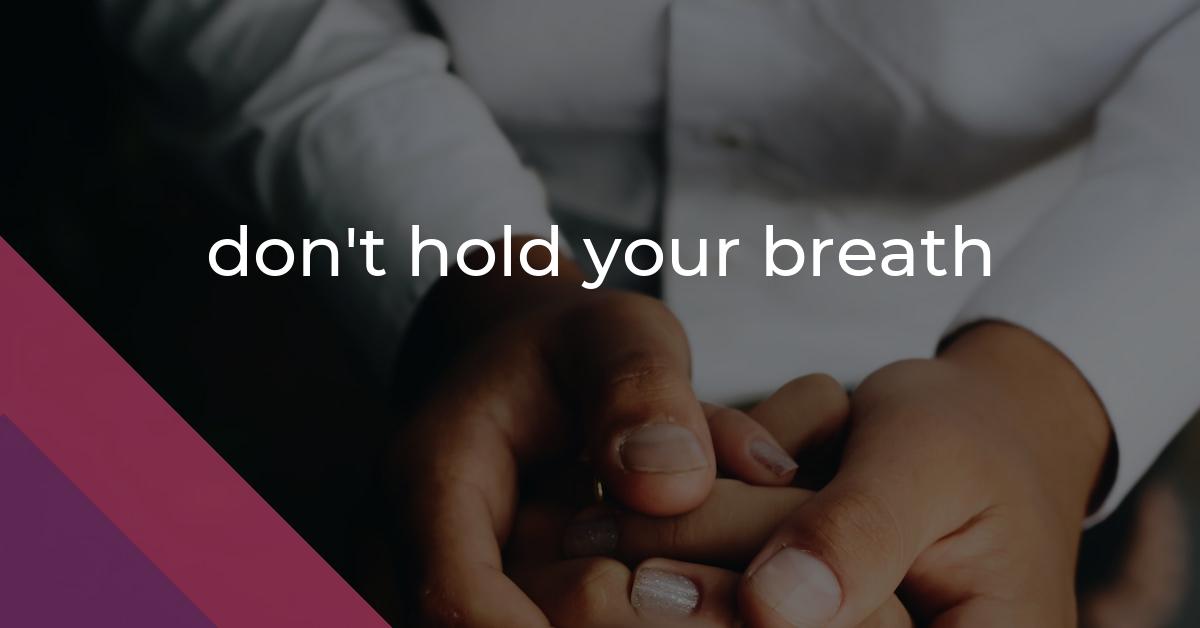don’t hold your breath: Idiom Meaning and Origin
What does ‘don't hold your breath’ mean?
The idiom "don't hold your breath" means to not expect something to happen or to not have high hopes for a particular outcome.

Idiom Explorer
The idiom "let down" means to disappoint or fail to fulfill someone's expectations or hopes.
The idiom "leave something to be desired" means that something is not as good as it should be or as one would expect it to be.
The idiom "kick one's heels" means to wait idly or impatiently for something or someone without any purpose or result.
The idiom "keep one's fingers crossed" means to hope for good luck or success. It is often used when someone is wishing for a positive outcome or outcome of an event.
The idiom "in your dreams" means that something is unlikely or impossible to happen in reality. It is often used as a dismissive response to indicate that someone's desire or suggestion is unrealistic.
The idiom "hurry up and wait" means to rush or be quick to do something, only to have to wait for a long time for the desired outcome or result. It reflects the frustrating and often futile nature of constantly being in a state of urgency followed by a period of inactivity.
The idiom "hope against hope" means to continue hoping for something despite there being little or no chance of it happening.
The idiom "hold onto your hat" means to prepare oneself for something surprising or exciting that is about to happen. It is often used to indicate that someone should be ready for a fast or unpredictable experience.
The idiom "hold one's water" means to have self-control and not give in to the urge to urinate. It is often used in informal settings to ask someone to be patient and wait.
Breathless Anticipation
The phrase "hold one's breath" is another commonly used idiom in the English language. It is used to convey the idea of eagerly waiting for something or anxiously anticipating a specific outcome. When someone tells you to "hold your breath," they are essentially asking you to wait and watch with anticipation.
The origin of this idiom can also be traced back to the practice of literally holding one's breath in anticipation. It is believed to have first been used in the early 19th century and has since become a popular expression to describe the act of eagerly or anxiously awaiting something.
The idiom "can't wait" is another expression that is closely related to "don't hold your breath." This phrase is used to convey a strong desire or eagerness for something that is about to happen. When someone says they "can't wait" for a certain event or outcome, they are expressing their excitement and anticipation.
"hold onto your hat" is yet another idiom related to the concept of anticipation. This phrase is used to convey the idea of being prepared for something surprising or unexpected to happen. It is often used in situations where one is about to experience something thrilling or unpredictable.
"hurry up and wait" is a phrase that perfectly captures the paradoxical nature of waiting with anticipation. It is often used to describe situations where someone is expected to act quickly or efficiently, only to find themselves waiting for an extended period afterward. This expression highlights the frustration and impatience that can come with anticipation.
Lastly, "hold off" is an idiom that is used to indicate the postponement or delay of something. When someone says to "hold off," they are essentially asking for patience or asking for a pause before proceeding. This expression is often used in situations where there is a need to wait for more information or for a particular time.
Overall, these idioms all revolve around the concept of anticipation and waiting. Whether it's the doubt and skepticism of "don't hold your breath," the excitement and eagerness of "can't wait," the need to be prepared for the unexpected in "hold onto your hat," the frustration and impatience in "hurry up and wait," or the need to delay something in "hold off," these idioms are all tied to the idea of anticipation and waiting for a particular outcome.
Example usage
Examples of how the idiom "don't hold your breath" can be used in a sentence:
- Don't hold your breath for that promotion; it's unlikely to happen anytime soon.
- I wouldn't hold my breath for him to apologize; he's not one to admit when he's wrong.
- If you're waiting for the government to fix all the country's problems, don't hold your breath.
More "Expectations" idioms



